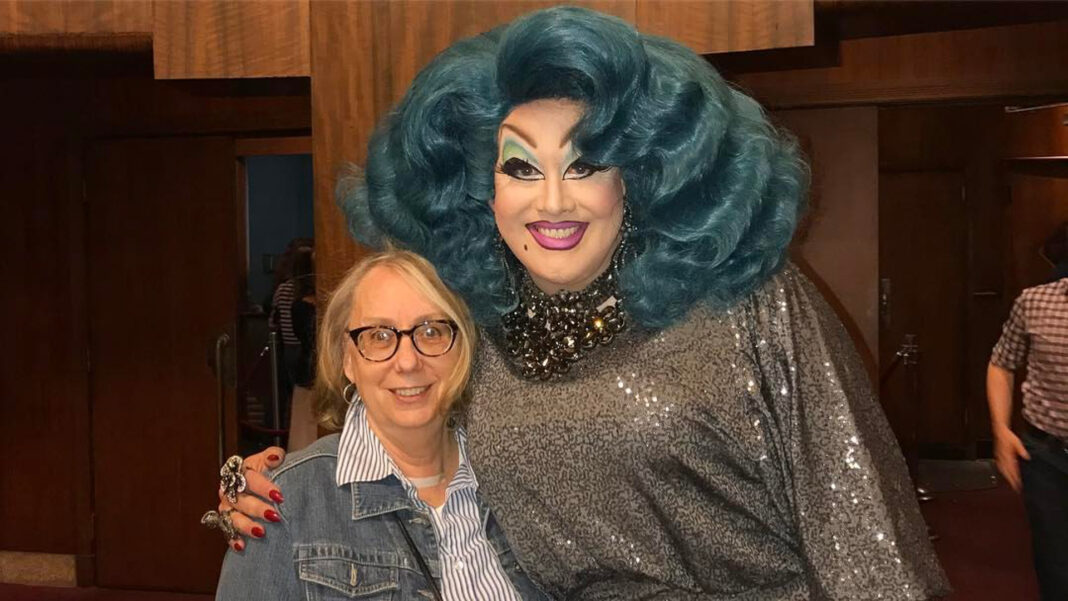If you’ve seen a John Waters film, you know who Mink Stole is. She has created such immortal on-screen characters as Connie Marble in Pink Flamingos; Taffy Davenport in Female Trouble; Peggy Gravel in Desperate Living; Dottie Hinkle in Serial Mom and more.
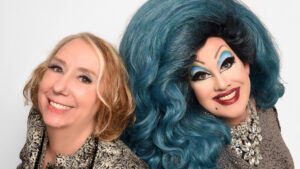
One person who loves Stole and could probably quote just about anything she’s ever said on screen is Peaches Christ, the drag persona of Joshua Grannell. Peaches and Stole are hitting the road in their two-woman show, Idol Worship. The show is a combination of songs, stories and conversation between these two longtime friends and colleagues. Grannell cast Stole in his 2010 film All About Evil.
Idol Worship begins its tour with two performances at San Francisco’s Eclectic Box on February 10th and 11th. On Valentine’s Day they will be at Cinema Salem in Salem, MA. On February 15th they will be at the Columbus Theater in Providence, RI. Stole and Peaches have two shows at The Green Room 42 in New York City on February 16th and 17th. (For those not in any of these cities, The Green Room 42 offers the ability to live stream the show.) The final two stops are Philadelphia’s Punchline on February 18th and The Comedy Loft in Washington, D.C. on February 20th.
Earlier this week I spoke with Stole about her long-standing friendship with Peaches/Grannell, her collaborations with John Waters and her thoughts on the gay backlash going on today. What follows are excerpts from our conversation that have been edited for length and clarity. To see the full interview (and I strongly encourage you to do so), please go to our YouTube channel.
Q: The Bible is filled with all kinds of warnings about worshiping idols. You and Peaches Christ are going on the road in a show called Idol Worship. So is it fair to assume that this show is going to be biblical?
Absolutely. We’re coming out and I’m going to be wearing togas and Joshua is coming as a camel. Actually, I am the idol in the eye of the Idol Worship show. This is Joshua’s fault. Apparently I am one of his idols, so he thought this would be fun.
There are worse things to be called, aren’t there?
There certainly are. I have to say I feel a bit of a heavy responsibility being an idol. That if I ever make a mistake or do anything that displeases him, I will be tossed from my pedestal and shattered to the ground. But I don’t think that’s going to happen. We’re really good friends.
You’ve known Joshua for quite some time. What surprises you most about your onstage relationship with his alter ego, Peaches Christ and how has that evolved over time?
I met him as Peaches Christ. And here’s we get into trouble. Because I will forget sometimes when I’m on stage with Peaches. I will call Peaches him and Peaches is a she. But Joshua is a him and it becomes, you know, kind of gender pronoun confusion.
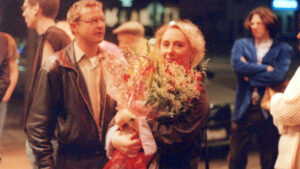
It was an amazing first meeting because he invited me to be a guest at his Midnight Mass show in San Francisco. This was about 20 years ago; neither of us can remember the exact date. I had never met him. Didn’t know who he was. But I thought, sure, why not? I’ll come in and it’ll be fun.
I came into the theater and he had done such an amazing job of making me feel welcome. There was a huge banner at the back of the stage saying Hail Mink! He gave me a bouquet of flowers and there was an animatronic Peggy Gravel on stage stirring a vat of rabies potion. They were showing Desperate Living.
I was so impressed by the effort that he had put in to make me feel good that I slightly fell in love with him. Nothing that he has done since then has made me feel any different.
Could you have imagined that this kind of response would ever develop?
Never in a million years. The reality is that when I was first working with John, all of the attention, or the huge bulk of the attention, was going to Divine. I remember interviews where I would be there with Divine and John, and I would not be asked one single question. I would sit there, keeping a smile on my face, pretending like that was fine. So I wasn’t accustomed to being the one in the spotlight. I was always accustomed to being over there in the corner, not unvalued, but not lionized. Not idolized. So it did come as a big shock to me when Joshua did this for me. I admit it’s very gratifying. It’s really lovely, but it’s not something I ever expected.
I interviewed Joshua/Peaches in 2019 when he was doing one of his stage parodies here in Los Angeles. Peaches said, “We actually find that when the show is flawless, it’s not as fun.” Do you share that that opinion with Peaches?
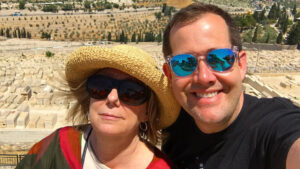
I kind of do. In the show that we’re doing, Idol Worship, we don’t script it. We have an outline. We have a roadmap to where we’re going to go. But there’s always room for spontaneity. We’re not afraid of mistakes. We’re not afraid of going, “Oh, I didn’t mean that. What I really meant to say was this.” That’s fine. We’re just being honest. I can’t say we’re being completely ourselves. We’re being our heightened selves because we’re on stage in front of an audience. But we are as ourselves as we can be.
It sounds like the show that you’re doing allows you to be like jazz musicians – you can just improv and riff however you want.
Pretty much. Joshua opens with a song and I come in with a song. We do a couple duets and we have conversation and film clips. It’s a lot of film clips he’s put together. Amazing film clip reel. I’ve seen some of it and it’s great. I forget sometimes what I have done. Then I see Connie next to Taffy, next to Peggy. It’s like, I did that. So it’s really interesting for me. Joshua puts my career and my work into a completely different perspective for me, which is really very interesting.
Was Peaches able to find any lost footage of you as Auntie Em from The Wizard of Odd or the Kansas City Pothead? [A very early John Waters film.)
He might have it somewhere, I’ve never asked. The Academy Museum here in LA has a show about John and the work that we’ve done. There’s no footage there. So I think if it existed, they would have it.
Five-and-a-half years ago, the Academy of Motion Picture Arts and Sciences held a big 30th anniversary screening of Hairspray at the Sam Goldwyn Theater. You just referenced Pope of Trash, which is the exhibit at the Academy Museum right now dedicated to John Waters’s career and work. What do you see as the changes that have taken place in the way this work has been accepted and embraced by the industry’s most formalized institution?
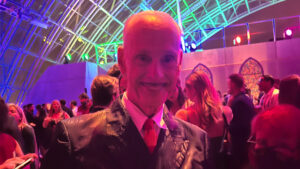
To tell you the truth, it baffles me. This is stuff that was reviled when we did it. Over 50 years ago now that we did Pink Flamingos, people hated us. Not everybody, but the mainstream press and the mainstream cinema world, they hated us. It was through John’s absolute dedication to what he had done. He worked really hard. I can’t give you the details. You would have to get them from John. But he pushed. He went out. He shot the movie. He went out and pushed and pushed and pushed until it found a home in the midnight world. Had he not been so ambitious and so determined, it could easily have just been forgotten. It could easily have had a couple of screenings in Baltimore and then just disappeared.
I think part of it is that John has proven himself to be so charming. He is so smart. He’s really a brilliant man. And he’s charming and he’s funny. I think John himself has basically charmed the opposition. Of course, Hairspray helped.
I have a question on behalf of one of the readers of Cultural Attache. His name is Joshua Schwartz and he regularly attends the John Waters camp. He was curious, what are the highlights for you of attending that camp each year?
I love being there. This is a camp. It’s out in the country. It’s in Kent, Connecticut. It’s completely isolated and it is filled with nuts. I mean, these people are fanatic. They have tattoos of John’s signature. They have my picture on their legs. These are people who are such intense fans and they have created a family. There are people who go every year, too, because this is where their friends come. This is where they convene. It’s like a convention out in the woods. They can drink, they can take drugs. They can completely leave their lives behind and just be in the world of their John Waters friends and fans. I think it’s amazing.
When I first heard about it, I thought it was insane. I thought it was the dumbest idea I’d ever heard. Nobody would possibly want to do that. And hundreds of people come every year. I walk into the room and feel this intense amount of love from all of these people. They love us and I love them back. It’s really a happy place.
So you get your summer fix of idol worship as well.
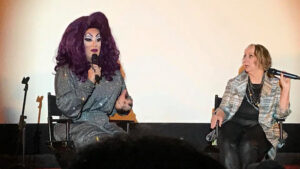
I do and it’s just enough. I’m usually there on Friday night and Saturday and then I disappear and somebody else comes in on Saturday night, Sunday. But it’s just enough for me. I feel like I’m being bathed in this glow of love. It’s really kind of amazing. It’s gratifying and wonderful, but I like it in that intense concentration of the camp rather than having it constantly in my life. That would be difficult.
I read an interview that you did in 2013 with Logan Lynn that was published on HuffPost. It was around the time of Jeffrey Schwarz’s documentary about Divine. Logan asked you about Roman Candles [another early Waters film.] At the time, you couldn’t remember if Divine was in it or not. [Divine is.] Logan said, “You have to fully rely on the reel in your head.” What I loved most was your response, which was, “It’s full of scratches and splice marks.” Over ten years later, how is the reel in your head?
It’s more scratched and more spliced together than ever! People ask me if I’m going to write a book, if I’m going to do memoirs, and I really can’t because I didn’t take notes. I can see film clips and I can remember certain things, but the minutia of my life that might be interesting, it’s gone. I’m a well into my senior years now. There’s only one way that I could possibly do it. And I’ve said this before, if I had lots and lots and lots of marijuana gummies and somebody to walk around writing down every word I said as I muttered to myself.
You’ve worked with John Waters rather famously and with Divine and presently the work that you’re doing with Peaches Christ. But a lot of people don’t know that you were off-Broadway working with Charles Ludlam in the early 80s.
Yeah, that was really a great time.
The thing that all these people have in common is they were not afraid to be unapologetically themselves. In the case of John and Charles Ludlam and Divine, that was certainly at a time when it was not okay to do that. One faced a lot of risk and condemnation if you did. It seems like we’re back in the time where being your authentic self is still a problem, particularly if you’re gay or if you do drag. What are your thoughts about where we are today and what is your hope for where we will end up?
I’m actually really surprised at the gay backlash. I really thought that when RuPaul came out with with Drag Race, that drag was going to the mainstream. I was really happy with things like Drag Queen Story Hour and drag brunches and stuff because it’s just performance. That’s all it is. It’s performance. It’s fun. People enjoy it. I have known nine-year-old boys and ten-year-old boys who dressed in drag. Doesn’t mean they want to be girls. It just means they want to dress in drag.
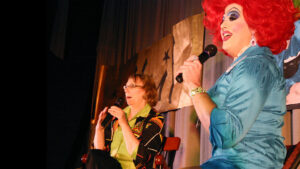
There’s such a thing as grooming for nefarious purposes, but you cannot groom somebody to be gay. You’re either gay or you’re not gay. Or you’re bi, or you’re this or you’re that, but you can’t be taught it. I was very happy with the Drag Race and the fact that everybody knows a drag queen. Now suddenly drag queens are ruining the world? The earth is going to shatter if a child sees a drag queen? I find that really difficult to deal with. I don’t understand it.
The irony as you were saying that you can’t you can’t be taught to be gay is that you can be taught to be a bigot.
You can be taught to hate. And that’s unfortunate. There are people who, in the name of whatever religion they practice, think that they have the right to tell other people what to do. I’m hoping for the backlash to the backlash and that there will be a flip. I’m optimistic. Cautiously.
Perhaps as you discuss the joys of just being yourself and having your career, that’ll help melt some of that away.
Laughter takes a lot of pain away. I do think people need to get out there and be themselves.
And we wouldn’t be having this conversation if you hadn’t done the very same thing.
Here’s my caveat to be yourself. When I got started I didn’t know who that was. People would say, be yourself. And I was like, I don’t know who that is. Am I this or am I that? You’re an awkward kid or awkward teenager. So am I this awkward person? Is there a butterfly inside this cocoon? I don’t know.
I was really lucky because I found a way. I lucked into a world that encouraged me to express myself and to figure out who myself was and to explore the options. So I wish that luck for everyone. Not everybody’s going to meet a John Waters. That’s an extraordinary piece of luck. I want people to be able to get out and read and play. People have to play.
To see the full interview with Mink Stole, please go here.
Main Photo: Mink Stole and Peaches Christ (Photo Courtesy Peaches Christ)











